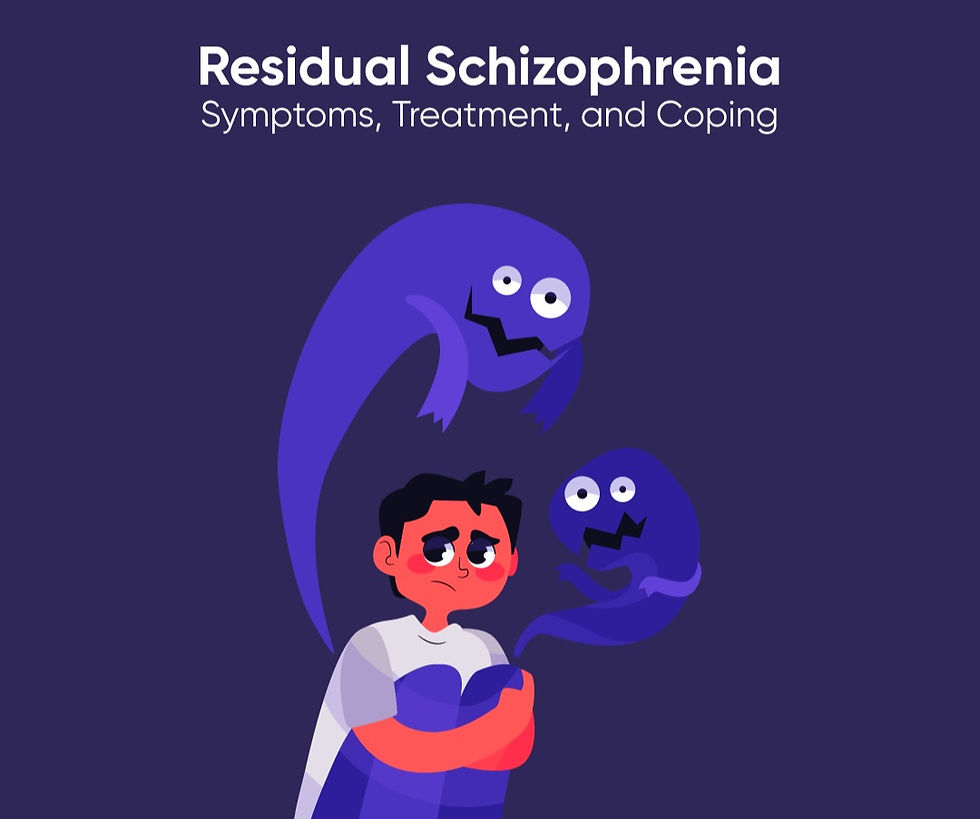Residual Schizophrenia: Symptoms and Management
- Doraemon

- 31 thg 3, 2024
- 2 phút đọc
Đã cập nhật: 18 thg 4, 2024
Residual Schizophrenia is a subtype of schizophrenia characterized by a history of one or more episodes of schizophrenia but with milder symptoms or in remission. In this post, we'll explore what Residual Schizophrenia entails, its symptoms, and the management strategies available.

Symptoms of Residual Schizophrenia:
Mild Psychotic Symptoms: Individuals with Residual Schizophrenia may experience residual symptoms of schizophrenia, such as occasional hallucinations, delusions, or disorganized thinking. However, these symptoms are typically less severe than during the acute phase of the illness.
Negative Symptoms: Negative symptoms of schizophrenia, such as social withdrawal, reduced emotional expression, and diminished motivation, may persist in individuals with Residual Schizophrenia, albeit to a lesser extent than during active phases of the illness.
Cognitive Impairments: Some individuals with Residual Schizophrenia may continue to experience cognitive impairments, including difficulties with memory, attention, and executive functioning. These cognitive deficits can impact daily functioning and quality of life.
Functional Impairment: Despite milder symptoms, Residual Schizophrenia can still lead to functional impairment in various areas of life, including work, social relationships, and self-care.

Management Strategies for Residual Schizophrenia:
Medication Maintenance: Continuation of antipsychotic medication is often recommended to prevent relapse and manage residual symptoms of schizophrenia. These medications can help stabilize mood, reduce the intensity of psychotic symptoms, and improve overall functioning.
Psychotherapy: Individual or group psychotherapy can be beneficial for individuals with Residual Schizophrenia to address residual symptoms, improve coping skills, and enhance quality of life. Cognitive-behavioral therapy (CBT) and supportive therapy are commonly used approaches.
Social Support: Establishing a strong support network of family, friends, and mental health professionals can provide emotional support, encouragement, and practical assistance in managing symptoms and navigating daily challenges.
Structured Routine: Maintaining a structured daily routine can help individuals with Residual Schizophrenia manage symptoms and improve functioning. This includes setting regular meal times, bedtime routines, and engaging in meaningful activities or hobbies.
Monitoring and Follow-Up: Regular monitoring by healthcare professionals is essential to track symptoms, adjust medication if necessary, and ensure the individual's overall well-being. Follow-up appointments with a psychiatrist or therapist can help address any emerging concerns or treatment needs.
It's crucial to approach the management of Residual Schizophrenia with a comprehensive and individualized treatment plan tailored to the individual's needs and goals. With ongoing treatment, support, and self-care strategies, individuals with Residual Schizophrenia can lead fulfilling lives and achieve their recovery goals. If you or someone you know is experiencing symptoms of Residual Schizophrenia, don't hesitate to seek help from a mental health professional.
Source: World Health Organization; American Psychological Association




Bình luận